Learning the basics of any language can be a great idea, especially when it comes to the beautiful and widely spoken French language.
Whether you're planning a trip to a French-speaking country or just want to expand your language skills, knowing some basic French words and phrases can be incredibly helpful.
Here's a guide to 100+ basic French words divided into categories to help you get started.
- Dr. Mrs. Vandertramp Verbs: 3 Easy Tricks For Beginners
- 50+ Essential Phrases For Emergency In French
- 25 Modern French Text Slang and Chat Abbreviations
- Is Lingopie Free? Plans, Pricing & Free Trial Guide

How Many French Words You Need to Know
The French language contains over 100,000 words, but you only need about 100 basic words to start having simple conversations in French. This small foundation is enough to order at restaurants, greet people, and handle essential tourist situations.
While the complete Larousse French dictionary lists 63,500 words, mastering French isn't about learning them all. Here's the practical breakdown of what you can do with different vocabulary levels:
- 100 words: Order food, ask basic questions, introduce yourself
- 300 words: Understand 65% of daily conversations, express simple needs
- 750 words: Travel confidently, handle most everyday situations
- 2,500 words: Follow native conversations, express complex thoughts
High-Frequency Words
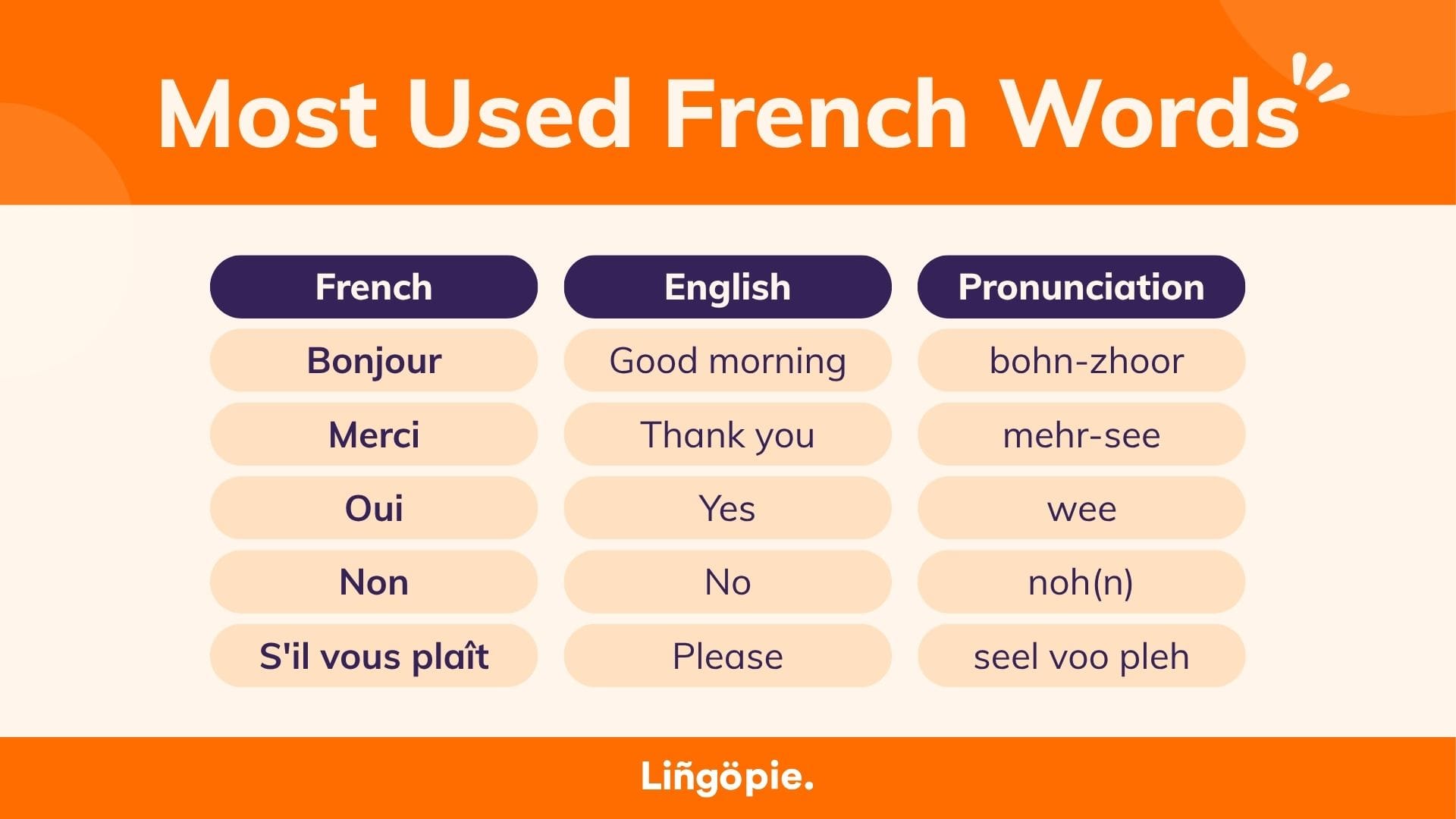
20 Most Used French Words
Focusing on the most frequently used words enables beginners to engage in basic conversations and understand everyday expressions. Below is a curated list of 20 fundamental French words, their meanings, and example sentences to illustrate their usage in various contexts.
| French Word | English Translation | Example Sentence |
|---|---|---|
| Bonjour | Hello/Good morning | Bonjour, comment ça va ? (Hello, how are you?) |
| Merci | Thank you | Merci pour votre aide. (Thank you for your help.) |
| Oui | Yes | Oui, j'aimerais un café. (Yes, I would like a coffee.) |
| Non | No | Non, je ne suis pas disponible. (No, I am not available.) |
| S'il vous plaît | Please | Un verre d'eau, s'il vous plaît. (A glass of water, please.) |
| Excusez-moi | Excuse me | Excusez-moi, où sont les toilettes ? (Excuse me, where is the restroom?) |
| Pardon | Sorry | Pardon, je ne vous ai pas vu. (Sorry, I didn't see you.) |
| Comment | How | Comment allez-vous ? (How are you?) |
| Pourquoi | Why | Pourquoi est-ce fermé ? (Why is it closed?) |
| Où | Where | Où est la gare ? (Where is the train station?) |
| Quand | When | Quand commence le film ? (When does the movie start?) |
| Qui | Who | Qui est-ce ? (Who is it?) |
| Combien | How much/How many | Combien ça coûte ? (How much does it cost?) |
| Je | I | Je suis étudiant. (I am a student.) |
| Tu | You (informal) | Tu veux venir avec moi ? (Do you want to come with me?) |
| Il/Elle | He/She | Il est professeur. (He is a teacher.) |
| Nous | We | Nous habitons à Paris. (We live in Paris.) |
| Vous | You (formal/plural) | Vous parlez anglais ? (Do you speak English?) |
| Ils/Elles | They (masc./fem.) | Elles sont étudiantes. (They are students.) |
| Et | And | J'ai un chat et un chien. (I have a cat and a dog.) |
Familiarity with these words will significantly enhance your ability to engage in basic French conversations and understand common expressions.
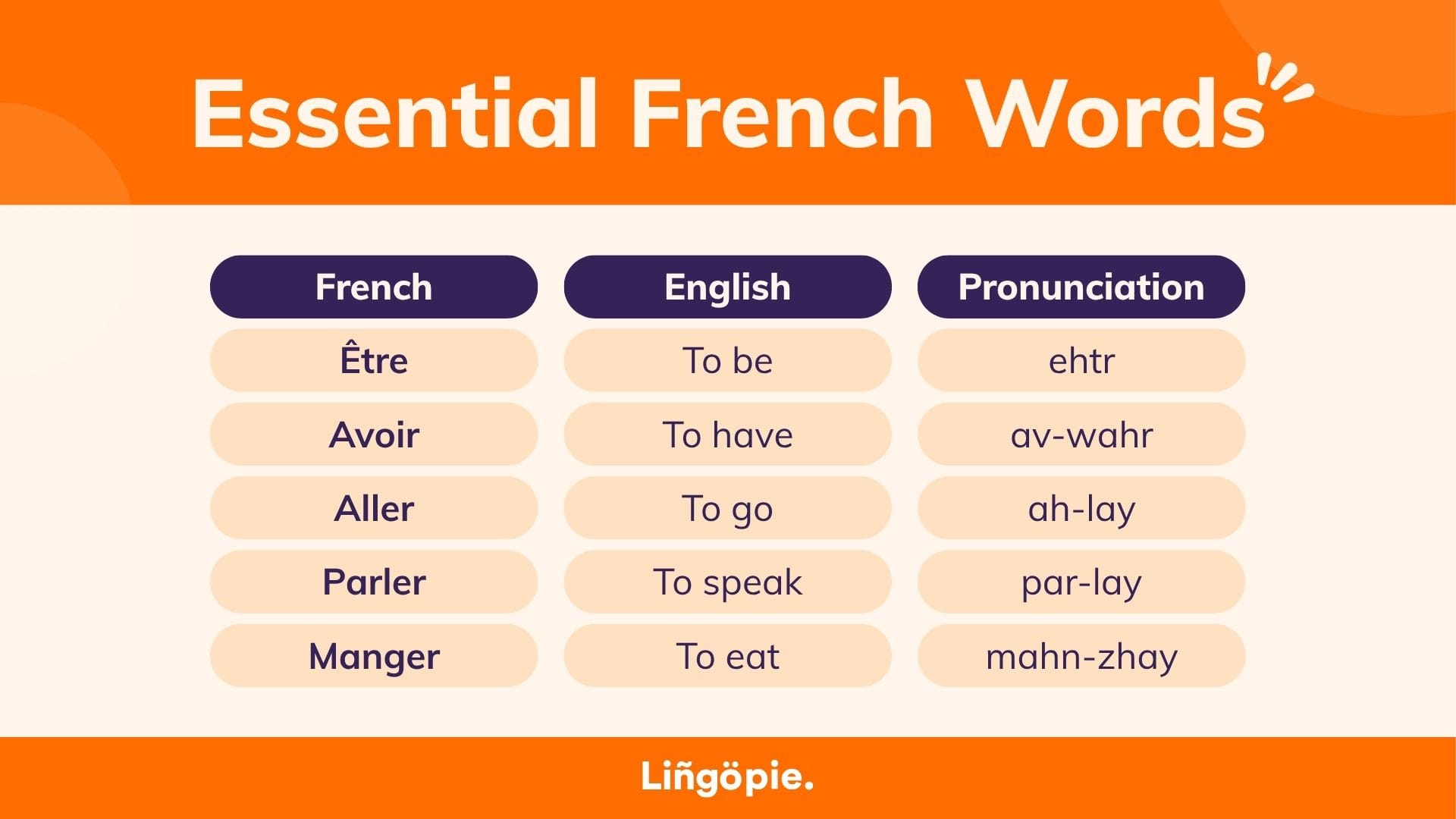
Essential French Verbs
Understanding basic French verbs is crucial for communication while traveling or beginning to learn French. The verbs below are carefully selected to help you express fundamental needs, ask for directions, order food, and engage in basic conversations.
| French Verb | English Meaning | Example Usage | Present (je) | Past (je) | Future (je) |
|---|---|---|---|---|---|
| Être | To be | Je suis à Paris (I am in Paris) | Je suis | J'ai été | Je serai |
| Avoir | To have | J'ai faim (I am hungry) | J'ai | J'ai eu | J'aurai |
| Aller | To go | Je vais au café (I'm going to the café) | Je vais | Je suis allé(e) | J'irai |
| Parler | To speak | Je parle français (I speak French) | Je parle | J'ai parlé | Je parlerai |
| Manger | To eat | Je mange au restaurant (I'm eating at the restaurant) | Je mange | J'ai mangé | Je mangerai |
| Boire | To drink | Je bois du café (I'm drinking coffee) | Je bois | J'ai bu | Je boirai |
| Dormir | To sleep | Je dors à l'hôtel (I sleep at the hotel) | Je dors | J'ai dormi | Je dormirai |
| Vouloir | To want | Je veux un café (I want a coffee) | Je veux | J'ai voulu | Je voudrai |
| Pouvoir | To be able to | Je peux vous aider (I can help you) | Je peux | J'ai pu | Je pourrai |
| Chercher | To look for | Je cherche la gare (I'm looking for the station) | Je cherche | J'ai cherché | Je chercherai |
| Prendre | To take | Je prends le métro (I'm taking the metro) | Je prends | J'ai pris | Je prendrai |
| Comprendre | To understand | Je comprends bien (I understand well) | Je comprends | J'ai compris | Je comprendrai |
| Demander | To ask | Je demande l'addition (I'm asking for the bill) | Je demande | J'ai demandé | Je demanderai |
| Aimer | To like/love | J'aime Paris (I love Paris) | J'aime | J'ai aimé | J'aimerai |
| Réserver | To reserve | Je réserve une table (I'm reserving a table) | Je réserve | J'ai réservé | Je réserverai |
| Payer | To pay | Je paie l'addition (I'm paying the bill) | Je paie | J'ai payé | Je paierai |
| Visiter | To visit | Je visite le musée (I'm visiting the museum) | Je visite | J'ai visité | Je visiterai |
| Acheter | To buy | J'achète un billet (I'm buying a ticket) | J'achète | J'ai acheté | J'achèterai |
| Regarder | To look at/watch | Je regarde la carte (I'm looking at the map) | Je regarde | J'ai regardé | Je regarderai |
| Attendre | To wait | J'attends mon ami (I'm waiting for my friend) | J'attends | J'ai attendu | J'attendrai |
These verbs form the foundation of basic French communication. Notice these important patterns:
- Past Tense: Most verbs use "avoir" + past participle
- Future Tense: Typically formed by adding -ai, -as, -a, -ons, -ez, -ont to the infinitive stem
- Present Tense: Regular -er verbs follow a consistent pattern
For beginners, focus first on mastering the present tense forms, then gradually incorporate past and future tenses as you become more comfortable with the language.
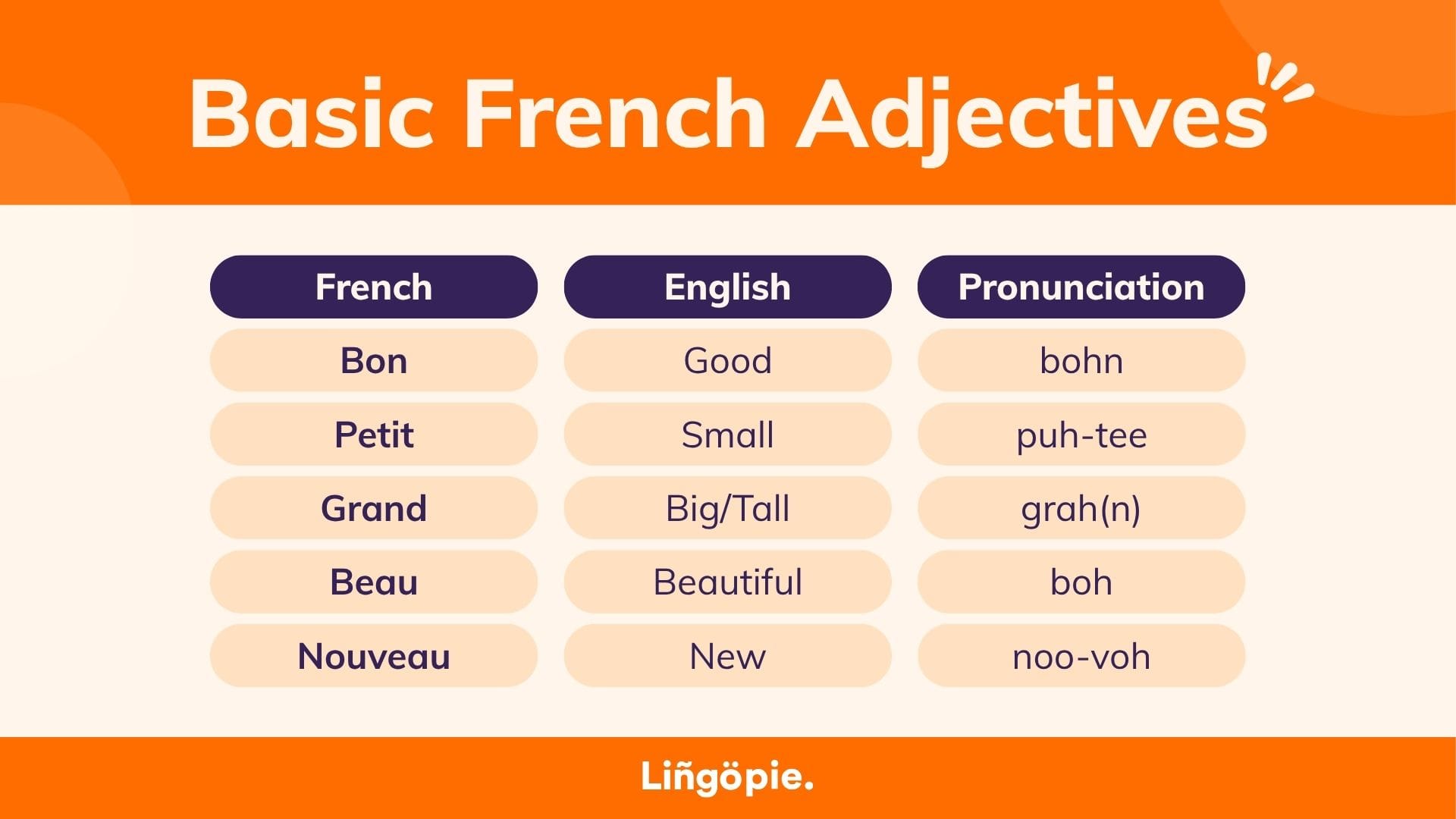
Basic French Adjectives
French adjectives must agree in gender (masculine/feminine) with the nouns they modify. This table includes common adjectives with their basic forms. Note that when an adjective starts with a vowel, the feminine form often doesn't change pronunciation.
For instance, "un grand homme" (a tall man) versus "une grande femme" (a tall woman).
| French Adjective | English Meaning | Masculine Singular | Feminine Singular |
|---|---|---|---|
| Bon | Good | bon | bonne |
| Petit | Small | petit | petite |
| Grand | Big/Tall | grand | grande |
| Beau | Beautiful | beau | belle |
| Nouveau | New | nouveau | nouvelle |
| Vieux | Old | vieux | vieille |
| Chaud | Hot | chaud | chaude |
| Froid | Cold | froid | froide |
| Cher | Expensive | cher | chère |
| Délicieux | Delicious | délicieux | délicieuse |
| Propre | Clean | propre | propre |
| Plein | Full | plein | pleine |
| Ouvert | Open | ouvert | ouverte |
| Fermé | Closed | fermé | fermée |
| Malade | Sick | malade | malade |
| Fatigué | Tired | fatigué | fatiguée |
| Content | Happy | content | contente |
| Occupé | Busy | occupé | occupée |
| Facile | Easy | facile | facile |
| Difficile | Difficult | difficile | difficile |
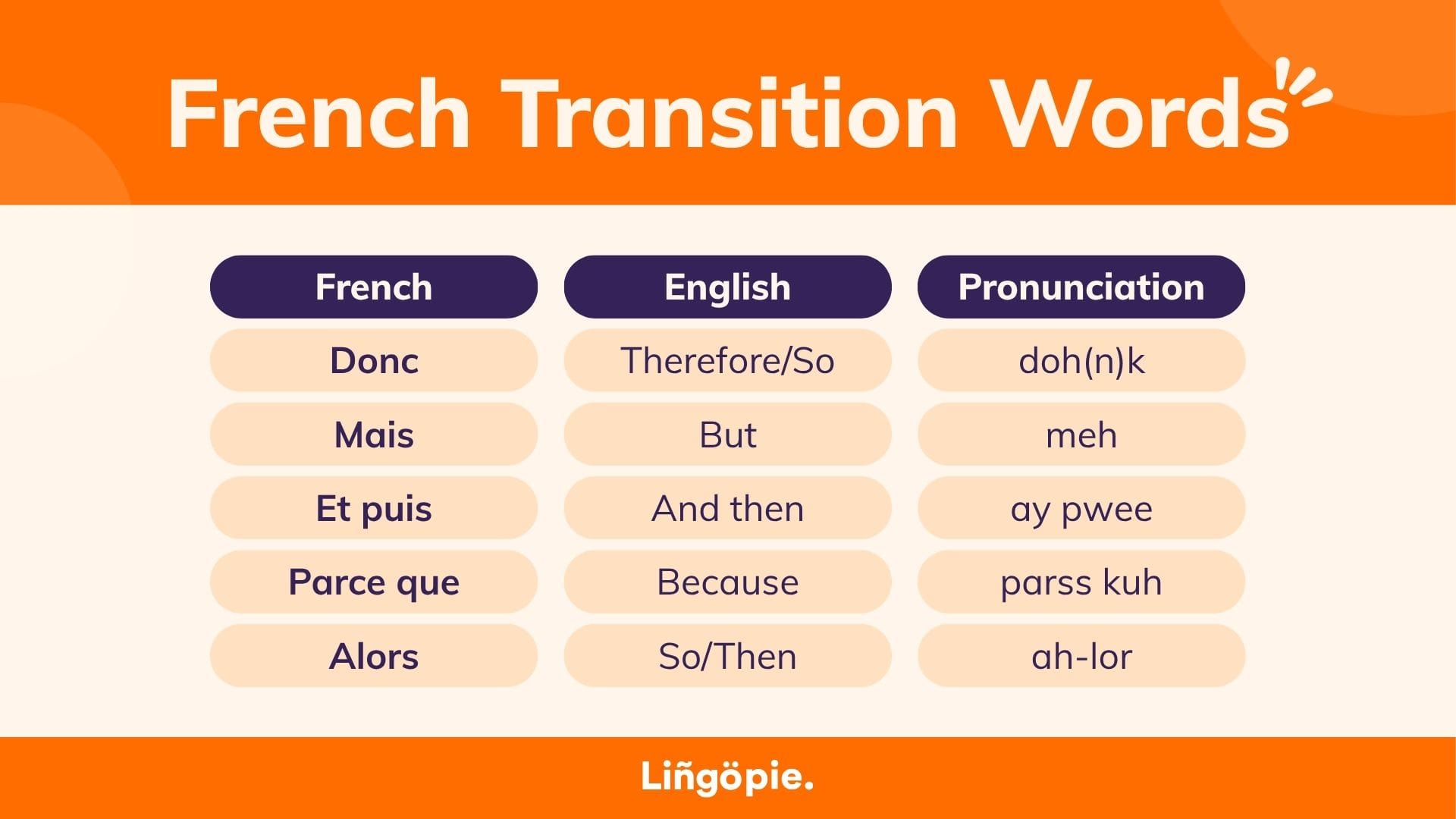
French Transition Words
Ready to speak like a native? One of the boosters you can add to your conversations is the use of transition words in French. Here are the 20 most commonly used French transition words and phrases that will help you connect your ideas in both speaking and writing.
| French Expression | English Meaning |
|---|---|
| Donc | Therefore/So |
| Mais | But |
| Et puis | And then |
| Parce que | Because |
| Alors | So/Then |
| D'abord | First/Firstly |
| Ensuite | Next/Then |
| Enfin | Finally/At last |
| Aussi | Also |
| Par exemple | For example |
| Cependant | However |
| En fait | In fact/Actually |
| Par contre | On the other hand |
| Comme | As/Like |
| Après | After |
| Pendant | During/While |
| C'est-à-dire | That is to say |
| Ou bien | Or else/Otherwise |
| Pourtant | However/Yet |
| Surtout | Especially/Above all |
Practical French Words And Phrases
Basic French Greetings and Phrases
Starting with basic French phrases used as greetings is essential for any language learner. These common French words and phrases will help you initiate conversations and respond politely in various situations where you need to speak French.
- Bonjour (Good morning)
- Bonsoir (Good evening)
- Bonne journée (Have a nice day)
- Au revoir (Goodbye)
- Merci (Thank you)
- Merci beaucoup (Thank you very much)
- S'il vous plaît (Please)
- Comment ça va ? (How are you?)
- Ça va (I'm fine)
- Comment allez-vous ? (How are you? formal)
- Comment vous appelez-vous ? (What is your name? formal)
- Je m'appelle... (My name is...)
- Oui (Yes)
- Non (No)
- De rien (You're welcome)
- Excusez-moi (Excuse me)
- Je suis désolé(e) (I am sorry)
- Je ne comprends pas (I don’t understand)
- Parlez-vous anglais ? (Do you speak English?)
- Je vous en prie (You're welcome)
- Combien ça coûte ? (How much does it cost?)
- Où sont les toilettes ? (Where are the toilets?)
Numbers & Counting In French
Numbers are among the most common French words that you need to master early on. They are used in everyday conversations, from shopping to telling time.
Learning these essential French words will help you navigate through France more comfortably.
- Un (One)
- Deux (Two)
- Trois (Three)
- Quatre (Four)
- Cinq (Five)
- Six (Six)
- Sept (Seven)
- Huit (Eight)
- Neuf (Nine)
- Dix (Ten)
To learn more about the French words for counting, check out our complete guide:
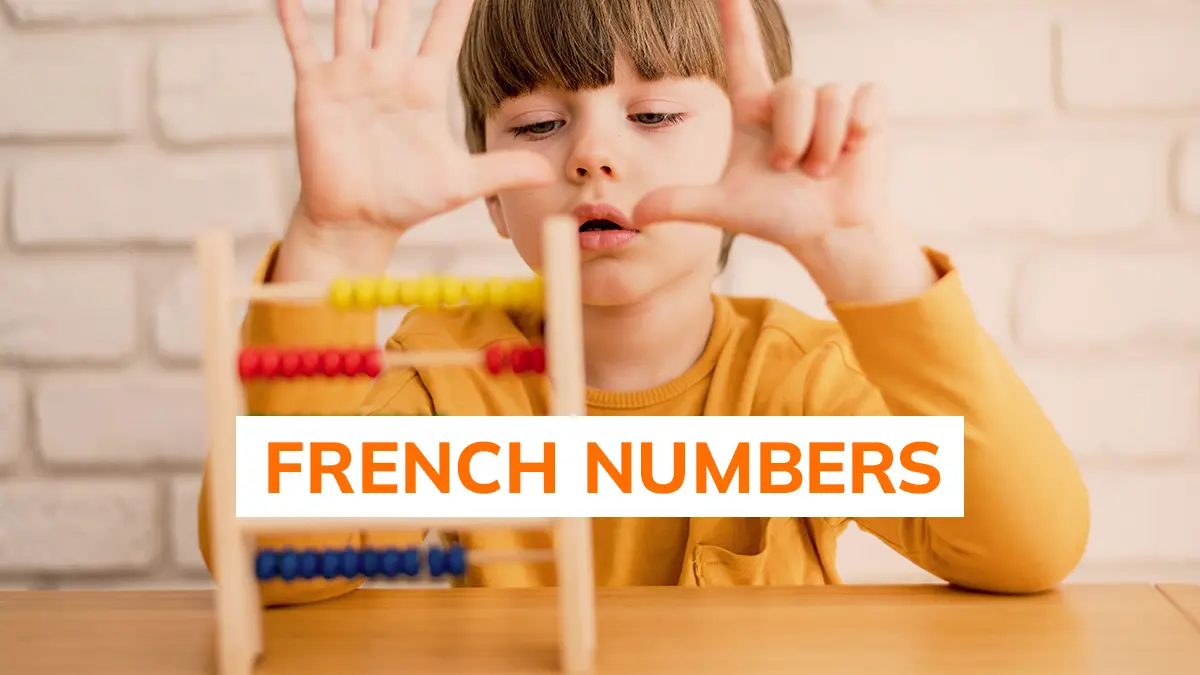
Days & Months In French
Unlike English, French days and months are not capitalized unless they begin a sentence. Also, when speaking about days in French, you'll often need to use articles (le, les) before them. For instance, when saying "on Monday," you'd say "le lundi."
| French | English |
|---|---|
| Lundi | Monday |
| Mardi | Tuesday |
| Mercredi | Wednesday |
| Jeudi | Thursday |
| Vendredi | Friday |
| Samedi | Saturday |
| Dimanche | Sunday |
| Janvier | January |
| Février | February |
| Mars | March |
| Avril | April |
| Mai | May |
| Juin | June |
| Juillet | July |
| Août | August |
| Septembre | September |
| Octobre | October |
| Novembre | November |
| Décembre | December |
Want to learn these words better? We highly recommend reading French books, watching French films, and listening to French music to see and hear vocabulary in action. This approach can also help you remember words more effectively.
Weather Terms In French
French weather expressions often use the verb "faire" (to make/do) rather than "être" (to be), which is different from English. For example, instead of saying "it is hot," French says "il fait chaud" (literally "it makes hot"). Do note too that weather discussions typically start with "Quel temps fait-il?" (What's the weather like?) or more informally, "Il fait quel temps?"
| French Expression | English Meaning |
|---|---|
| Il fait chaud | It's hot |
| Il fait froid | It's cold |
| Il pleut | It's raining |
| Il neige | It's snowing |
| Il fait beau | It's beautiful (nice weather) |
| Il fait mauvais | It's bad weather |
| Il fait du soleil | It's sunny |
| Il fait du vent | It's windy |
| Il fait frais | It's cool |
| Il fait humide | It's humid |
| Il y a des nuages | There are clouds |
| Il y a du brouillard | There's fog |
| Il fait orageux | It's stormy |
| Il gèle | It's freezing |
| Il grêle | It's hailing |
| Il fait doux | It's mild |
| Le ciel est couvert | The sky is overcast |
| Il fait lourd | It's muggy |
| Il y a des éclaircies | There are clear spells |
| Le temps est variable | The weather is changeable |
Question Words In French
Questions are fundamental in any language. Knowing the most common French words for asking questions will enable you to seek information and clarify doubts, making your communication more effective.
These common French phrases will be crucial as you interact with French speakers.
- Qu'est-ce que c'est ? (What is it?)
- Où ? (Where?)
- Quand ? (When?)
- Pourquoi ? (Why?)
- Comment ? (How?)
- Quelle heure est-il ? (What time is it?)
- Est-ce que...? (Is it...?)
Transportation Vocabulary In French
There's no denying that understanding transportation vocabulary in French is crucial for traveling and navigating cities. Note that in French, different prepositions are used with transportation: "en" for enclosed vehicles (en bus, en voiture) and "à" for more open forms of transport (à vélo, à pied).
| French Term | English Meaning |
|---|---|
| Le métro | Subway/Underground |
| Le bus/L'autobus | Bus |
| Le train | Train |
| La voiture | Car |
| Le taxi | Taxi |
| Le vélo | Bicycle |
| L'avion | Airplane |
| Le tramway | Tram |
| Le bateau | Boat |
| La moto | Motorcycle |
| Le scooter | Scooter |
| L'autocar | Coach |
| Le TGV | High-speed train |
| Le RER | Regional express train |
| La navette | Shuttle |
| La gare | Train station |
| L'arrêt de bus | Bus stop |
| L'aéroport | Airport |
| Le stationnement | Parking |
| La station | Station |
When using public transportation in France, it's important to validate your ticket ("composter le billet") before boarding trains and keep your ticket until the end of your journey. More importantly, take note of the following station vocabulary:
- En retard - Delayed
- Annulé - Cancelled
- En panne - Broken down
- Perturbé - Disrupted
- Grève - Strike
- Embouteillage - Traffic jam
- Le quai - Platform
- La voie - Track
- Le terminal - Terminal
- Les bagages - Luggage
Want to ask for directions in French? Check out our guide!
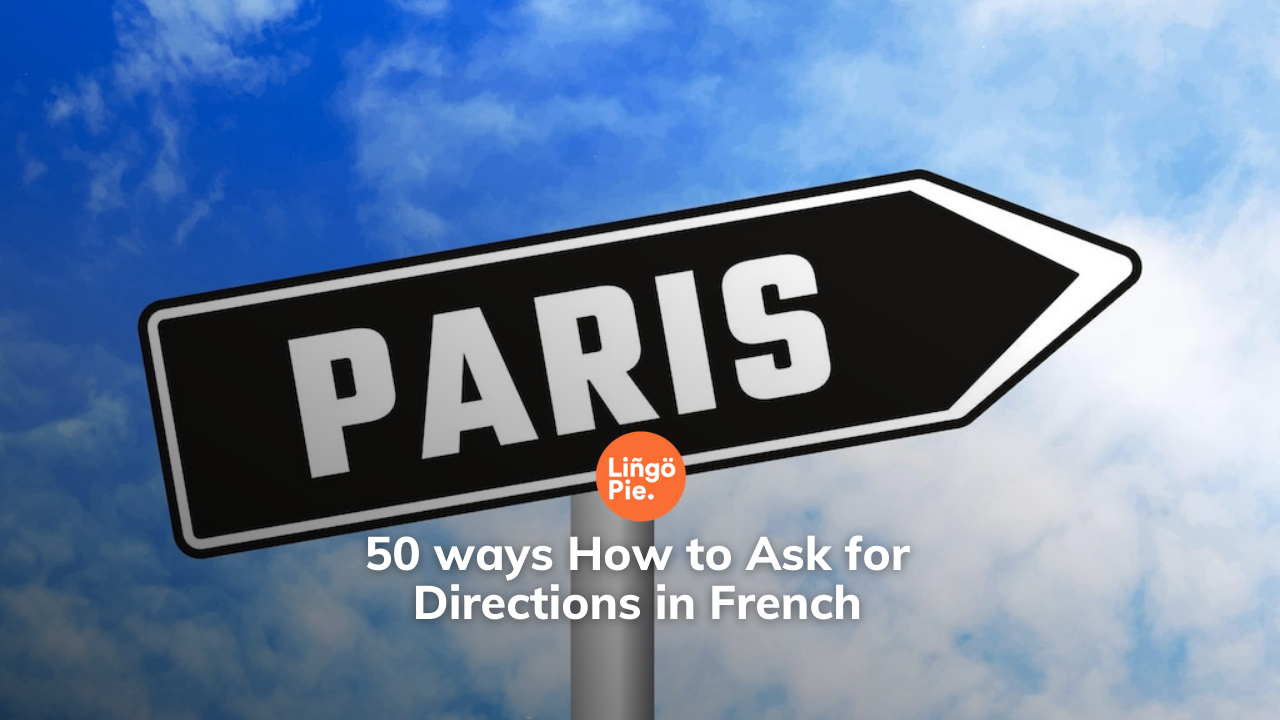
Accommodation Words In French
When traveling in French-speaking countries, knowing accommodation-related vocabulary is essential for booking rooms, checking in, and addressing any concerns during your stay. Whether you're staying at a hotel, hostel, or vacation rental, these terms and phrases will help you communicate your needs effectively.
| French Term | English Meaning |
|---|---|
| L'hôtel | Hotel |
| La chambre | Room |
| La réception | Reception desk |
| La clé/carte | Key/key card |
| Le lit | Bed |
| La salle de bains | Bathroom |
| Le petit-déjeuner | Breakfast |
| L'ascenseur | Elevator |
| L'étage | Floor (level) |
| La climatisation | Air conditioning |
| Le wifi | WiFi |
| Le parking | Parking lot |
| La réservation | Reservation |
| L'auberge de jeunesse | Youth hostel |
| Le gîte | Holiday cottage |
| La location | Rental |
| Le balcon | Balcony |
| La vue | View |
| Le ménage | Housekeeping |
| Le service d'étage | Room service |
Food Vocabulary In French
Food and drink are significant parts of French culture. Knowing these common French words will enrich your dining experience and make it easier to order food and drinks.
These are some of the most enjoyable basic French words to learn, especially for food lovers.
- Le pain (Bread)
- Le fromage (Cheese)
- Le vin (Wine)
- L'eau (Water)
- La viande (Meat)
- Les légumes (Vegetables)
- Les fruits (Fruits)
- Le café (Coffee)
- Le thé (Tea)

Shopping Words In French
Shopping in French-speaking countries requires specific vocabulary for finding what you need, asking about prices, sizes, and handling transactions.
| French Term | English Meaning |
|---|---|
| Le magasin | Store/Shop |
| La boutique | Boutique |
| Le marché | Market |
| La caisse | Cash register |
| Les soldes | Sales |
| Le prix | Price |
| La taille | Size |
| La couleur | Color |
| L'argent | Money |
| La carte bancaire | Credit/Debit card |
| Les espèces | Cash |
| Le reçu | Receipt |
| La réduction | Discount |
| L'essayage | Fitting room |
| Le remboursement | Refund |
| Le rayon | Department |
| Le panier | Shopping basket |
| Le caddie | Shopping cart |
| La vitrine | Shop window |
| L'étiquette | Price tag |
Basic French Words for People

Understanding the common French words for people is essential for building basic sentences and engaging in conversation with a native French speaker.
These words include terms for family members, friends, and general terms for individuals, helping you to describe and discuss people around you.
- L'homme (Man)
- La femme (Woman)
- Le garçon (Boy)
- La fille (Girl)
- L'ami (Friend, male)
- L'amie (Friend, female)
French Words for Professions
Learning the most common French words for professions can help you in various scenarios, from talking about your job to understanding others' professions.
These basic French words will also assist in expanding your vocabulary related to daily life and work environments.
- Le médecin (Doctor)
- L'enseignant (Teacher, male)
- L'enseignante (Teacher, female)
- L'ingénieur (Engineer)
- Le cuisinier (Cook, male)
- La cuisinière (Cook, female)

Parts of the House and Furniture in French
Describing your surroundings is a practical skill in any language.
Learning French words for parts of the house and furniture will help you speak about your home environment and understand others when they do.
- La maison (House)
- La chambre (Bedroom)
- La cuisine (Kitchen)
- Le salon (Living room)
- La salle de bain (Bathroom)
- La table (Table)
- La chaise (Chair)
- Le lit (Bed)
Places in French

Being able to name various places is crucial for moving around and understanding directions.
These common French words cover a range of locations you might visit or need to talk about. They are some of the most common French words used in everyday conversations.
- La ville (City)
- Le village (Village)
- La rue (Street)
- Le restaurant (Restaurant)
- Le café (Cafe)
- L'école (School)
- Le magasin (Shop)
- La plage (Beach)
Want to learn more? Take advantage of language learning resources and tools such as flashcards, vocabulary apps, and online courses.
Animals & Nature Vocabulary in French
Nature and animals are popular topics in everyday discussions and travel. Learning these common words will help you appreciate and talk about the natural world in French.
A simple French word from this list that enrich your vocabulary and make conversations more interesting.
- Le chat (Cat)
- Le chien (Dog)
- L'oiseau (Bird)
- Le poisson (Fish)
- L'arbre (Tree)
- La fleur (Flower)
- La mer (Sea)
- La montagne (Mountain)
- Le soleil (Sun)
- La lune (Moon)
- La terre (Earth)
FAQs
Here are also some of the most frequently asked questions relating to learning French vocabulary
How many words do you need for a basic conversation in French?
To have a basic conversation in French, you typically need to know around 500 to 1,000 words. This vocabulary range includes common French words and phrases that cover everyday topics, allowing you to understand and participate in simple dialogues with native speakers.
Learning these essential words will significantly improve your French skills and enable you to communicate effectively in various situations, such as ordering in French restaurants or asking for directions.
What simple words are taught in French in the first lesson?
In the first lesson when you learn French, you are usually introduced to basic French words and phrases such as "bonjour" (hello), "merci" (thank you), "oui" (yes), and "non" (no).
These simple words are foundational and help new learners start speaking French right away. Also, you might learn how to introduce yourself with "je m'appelle" (my name is) and ask basic questions like "comment ça va?" (how are you?).
How many words for B2 in French?
To achieve a B2 level in French, you typically need to know around 4,000 to 5,000 words. This vocabulary allows you to understand and engage in more complex conversations and read a variety of texts with ease.
How can I learn French fast?
To learn French quickly, immerse yourself in the language through intensive practice. This includes:
- Daily Practice: Spend at least 30 minutes to an hour each day learning French.
- Language Apps: Use language learning apps for structured lessons and practice.
- Media Consumption: Watch French TV shows, movies, and listen to French music and podcasts.
- Speaking Practice: Engage in conversations with native speakers or language exchange partners.
How can I practice French words?
Practicing French vocabulary can be effective and enjoyable with these methods:
- Flashcards: Create or use digital flashcards to regularly review new words.
- Reading: Read books, articles, and news in French to see words in context.
- Writing: Write daily journals or short stories using new vocabulary.
- Language Games: Use apps and games designed to reinforce vocabulary through repetition and context.
- Speaking: Incorporate new words into conversations with native speakers or fellow learners.
Summing Up: 100 Basic Essential Words in the French Language

Learning the most common French phrases will give you a solid foundation to start speaking French.
Engaging with French vocabulary through practical categories such as greetings, numbers, and common questions can help you navigate daily conversations more effectively.
Remember, practice is key, and immersing yourself in the French language and culture will significantly enhance your language-learning journey.
To further boost your French skills, why not try a fun and interactive way to learn? Sign up for a free trial with Lingopie today and immerse yourself in the French language through movies and TV shows. It's a great way to learn new words and phrases in context, and it's also fun.
Bon apprentissage!










